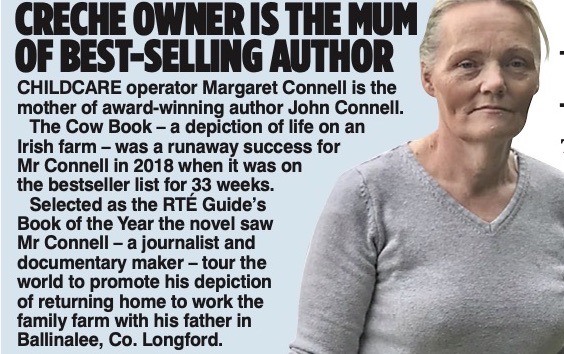By: Michael O’Farrell – Investigations Editor
IRELAND’S childcare system will have to be completely rebuilt after the Covid crisis if it is to meet the needs of families and the economy, experts have cautioned.
The warning comes as belated Government efforts to provide childcare for frontline workers collapsed into disarray this week.
Last night, policy researchers and childcare providers said the debacle – and the uncertain ability of the childcare sector to reopen soon – was indicative of a broken system.
‘I think we will have to move to a model where the State will be much more involved rather than just giving subsidies to the private sector,’ Economic and Social Research Institute expert Bertrand Maître told the Irish Mail on Sunday.
Mr Maître (pictured above) said Ireland’s childcare system was broken before the crisis and, together with the high cost of housing, was deterring inward investment from multinationals.
Inadequate childcare also disproportionately affects those who need it most. ESRI research carried out by Mr Maître late last year found 25% of lone parent families in Ireland have an unmet childcare need.
This means that even before the Covid crisis many of those who needed childcare most were unable to access it, resulting in poverty and inequality traps.
Other factors – such as the high cost of childcare here compared to other EU countries – means all of Ireland’s working parents are severely disadvantaged.
‘The cost of childcare is absolutely enormous in Ireland compared to other countries,’ said Mr Maître.
‘That’s the main reason why people here in Ireland have an unmet need for childcare.’ Mr Maître – the ESRI programme co-ordinator for research on social inclusion and equality – predicted Ireland would eventually have to move to a Scandinavian-type model where local municipalities are responsible for childcare.
‘I think we will move to that but I don’t know when. The finances are going to be in such a bad state that it’s not going be a priority.
‘In Denmark it’s compulsory for the municipalities to provide childcare and they have a legal obligation to take all the children. And the issues of cost doesn’t exist in those countries for parents. It’s much more affordable.
‘I think we will have to move at some stage to some kind of a public system where the State will be looking after childcare. I don’t see why the State would be looking after schools – primary and secondary schools and so on – and not early education and childcare.’
Other experts such as awardwinning childcare provider Margaret Connell said the Covid crisis provided an opportunity to reassess how pre-school children are cared for in Ireland.

In particular she said the space requirements needed for social distancing in the short term could lead to better facilities for children.
‘We need to look at this model again when we’re planning this,’ she said. ‘It’s a bit like the nursing homes. Should the elderly be all cocooned in one building – or should we try and make then more independent in the community. Is it not the same with children – do children not deserve more space?’
‘Of course the ratio will have to come down but that part of it is going to be positive for the children and the Government will have to put funding into that, but it possibly will be a better model.’
Ms Connell said providers based in the countryside were better placed than their city counterparts to react to the Covid crisis, particularly during the summer months.
‘In the countryside we’re going to be able to do it faster because most people have access to quite an extensive outdoor area,’ she said adding that Tusla should act in an advisory capacity to look at the merits of different settings in urban and rural areas.
Ms Connell also raised the issue of informal workers – the 35,000 unregistered childcare minders and relatives who prop up Ireland’s preschool sector in the absence of any other solution from the State.
‘They want to get back to work. They want to get affordable childcare. But if we don’t have a model rolled out, of course they’re going to go to the black market. This is the reality. This is what’s happening.
‘I’m not saying the childminders are not doing a good job but there is absolutely no regulation. That is the area I worry about,’ she said.
The Government oversight plans for the informal sector, to be rolled out in the coming years, began with Tusla registration, a legal requirement since 2016. But as of December 2019 just 120 minders had registered.
‘The problems that we have here in Ireland, it’s been there for really quite a long time,’ said Mr Maître.
‘It’s very difficult to see what’s going to happen. We don’t know how long things are going to be like this. But people aren’t going to be able to go back to work until childcare reopens again.
‘And if people have lost a lot of income, they won’t be able to afford to put their kids in those childcare places. So it’s a vicious circle.’
Yet, in the wake of the collapse of its mooted childcare scheme for frontline workers this week, the Government is struggling to come up with a solution during the Covid crisis, never mind the long term.
Before the pandemic, the State was paying €12m a week for the limited free services provided to parents in pre-schools.
Today it is paying €15m a week in wage supports to the employees of those pre-schools, and receiving no service.
The collapsed Covid scheme called for childcare employees, currently paid to stay at home, to provide care in the homes of frontline workers.
Aside from well-publicised insurance problems and fears of Covid spread, the idea was a nightmare for workers who faced being alone in a stranger’s house.
‘They were afraid,’ said Ms Connell. ‘If you’re going into someone’s house, you don’t know the children and you’re also wondering about the Covid. But I don’t think that was the biggest fear. The biggest fear was the vulnerability. A lot of people now in the childcare sector really worry now because of allegations – it was an absolute minefield.’
Ms Connell also questioned why childcare students have not been deployed like gardaí and nurses have, an idea the Department of Children and Youth Affairs did not respond to when the MoS asked this weekend.
Instead a spokesman issued a statement saying the department ‘remains strongly focused on developing solutions to the significant challenges of a phased reopening of early learning and childcare facilities for June 29 in line with the Government’s Road Map on Reopening Society and Business.
‘We continue to work with Government colleagues, public health officials and the childcare sector to achieve this goal including the provision of updates to all stakeholders,’ the statement said.
A new departmental advisory group involving all key stakeholders met twice this week to consider how to plan for a reopening of childcare and the department is costing proposals for the phased reopening in line with the Government’s road map for reopening society and business.
The statement said planning for a reopening was ‘complex work’ being informed by ‘NPHET guidance and the Return to Work Safely Protocols’.
It added that considerations included the difficulties in maintaining social distancing among children, their learning needs, the financial stability of the sector with reduced ratios, the inability of parents to pay more and the challenge of ensuring an adequate supply of childcare workers.
Irish au pair industry ‘decimated’ but demand for live-out nannies set to increase
THE au pair industry has been destroyed by the Covid-19 crisis leaving thousands of families without childcare during the summer months.
‘In a word, it’s decimated,’ said Cormac Maher, owner of www.aupairireland.ie – a site through which Irish families seek au pairs.
‘You have to feel bad for people who have to go out and work through all this and they can’t send their kids to childcare. They’re in a really tough spot,’ said Mr Maher.
According to the Migrant Rights Centre of Ireland there were as many as 20,000 au pairs working for Irish households in 2018. That number is thought to have decreased by about a third since a landmark employment rights case that year led to au pairs being paid the minimum wage.
However, thousands of households here still employ au pairs and last year aupairireland.ie hosted 3,650 job ads – half of which resulted in placements.
Other agencies place thousands more into Irish homes from across Europe and further afield. But since the Covid crisis that demand has virtually disappeared. ‘It literally fell overnight,’ said Mr Maher. ‘Obviously, people don’t want strangers coming into their homes possibly carrying the virus.
‘The number of jobs being posted is about one tenth what it was prior to the lockdown. So overall, it’s decimation.’ While uncertainty about travel restrictions is a major factor for traditional au pairs, Mr Maher said many au pairs – especially in cities – were now resident in Ireland and did not live with families.
‘It’s not the typical thing you think of anymore – some girl coming over from Sweden to mind a kid,’ he said.
‘It could be a woman in her late 40s, it could be a girl in her early 20s, they could be married, they could be single. The classic definition of an au pair no longer exists. There are lots of live-out au pairs and it’s by far the most popular option in cities where you might not have a spare room.’ Many of these au pairs – essentially nannies without formal qualifications – are Brazilian, Filipina or Eastern European.
Mr Maher believes this means the ‘live-out’ sector of the industry – at least – can recover quickly once lockdown is lifted.
He said: ‘A lot of them are hiring from within Ireland so I would see an increase in jobs when the lockdown is lifted – a lot of people do hire very quickly.
‘I don’t think it’s going to be Armageddon or anything but people are going to be competing for the available au pairs, so that could increase the wage and conditions for the au pairs.’




